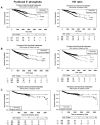Higher vitamin B6 status is associated with improved survival among patients with stage I-III colorectal cancer
- PMID: 35394006
- PMCID: PMC9348990
- DOI: 10.1093/ajcn/nqac090
Higher vitamin B6 status is associated with improved survival among patients with stage I-III colorectal cancer
Abstract
Background: Folate-mediated 1-carbon metabolism requires several nutrients, including vitamin B6. Circulating biomarker concentrations indicating high vitamin B6 status are associated with a reduced risk of colorectal cancer (CRC). However, little is known about the effect of B6 status in relation to clinical outcomes in CRC patients.
Objectives: We investigated survival outcomes in relation to vitamin B6 status in prospectively followed CRC patients.
Methods: A total of 2031 patients with stage I-III CRC participated in 6 prospective patient cohorts in the international FOCUS (folate-dependent 1-carbon metabolism in colorectal cancer recurrence and survival) Consortium. Preoperative blood samples were used to measure vitamin B6 status by the direct marker pyridoxal 5'-phosphate (PLP), as well as the functional marker HK-ratio (HKr)[3'-hydroxykynurenine: (kynurenic acid + xanthurenic acid + 3'-hydroxy anthranilic acid + anthranilic acid)]. Using Cox proportional hazards regression, we examined associations of vitamin B6 status with overall survival (OS), disease-free survival (DFS), and risk of recurrence, adjusted for patient age, sex, circulating creatinine concentrations, tumor site, stage, and cohort.
Results: After a median follow-up of 3.2 y for OS, higher preoperative vitamin B6 status as assessed by PLP and the functional marker HKr was associated with 16-32% higher all-cause and disease-free survival, although there was no significant association with disease recurrence (doubling in PLP concentration: HROS, 0.68; 95% CI: 0.59, 0.79; HRDFS, 0.84; 95% CI: 0.75, 0.94; HRRecurrence, 0.96; 95% CI: 0.84, 1.09; HKr: HROS, 2.04; 95% CI: 1.67, 2.49; HRDFS, 1.56; 95% CI: 1.31, 1.85; HRRecurrence, 1.21; 95% CI: 0.96,1. 52). The association of PLP with improved OS was consistent across colorectal tumor site (right-sided colon: HROS, 0.75; 95% CI: 0.59, 0.96; left-sided colon: HROS, 0.71; 95% CI: 0.55, 0.92; rectosigmoid junction and rectum: HROS, 0.61; 95% CI: 0.47, 0.78).
Conclusion: Higher preoperative vitamin B6 status is associated with improved OS among stage I-III CRC patients.
Keywords: HKr; PAR; PLP; colon cancer; colorectal cancer; one-carbon metabolism; rectal cancer; recurrence; survivorship; vitamin B6.
© The Author(s) 2022. Published by Oxford University Press on behalf of the American Society for Nutrition.
Figures


Similar articles
-
Chemoprevention of colorectal cancer: systematic review and economic evaluation.Health Technol Assess. 2010 Jun;14(32):1-206. doi: 10.3310/hta14320. Health Technol Assess. 2010. PMID: 20594533
-
Circulating tryptophan-kynurenine pathway metabolites are associated with all-cause mortality among patients with stage I-III colorectal cancer.Int J Cancer. 2025 Feb 1;156(3):552-565. doi: 10.1002/ijc.35183. Epub 2024 Sep 23. Int J Cancer. 2025. PMID: 39308420 Free PMC article.
-
Neopterin, kynurenine metabolites, and indexes related to vitamin B6 are associated with post-stroke cognitive impairment: The Nor-COAST study.Brain Behav Immun. 2024 May;118:167-177. doi: 10.1016/j.bbi.2024.02.030. Epub 2024 Feb 28. Brain Behav Immun. 2024. PMID: 38428649
-
The effect of vitamin B6 on cognition.Cochrane Database Syst Rev. 2003;(4):CD004393. doi: 10.1002/14651858.CD004393. Cochrane Database Syst Rev. 2003. PMID: 14584010
-
Impact of residual disease as a prognostic factor for survival in women with advanced epithelial ovarian cancer after primary surgery.Cochrane Database Syst Rev. 2022 Sep 26;9(9):CD015048. doi: 10.1002/14651858.CD015048.pub2. Cochrane Database Syst Rev. 2022. PMID: 36161421 Free PMC article.
Cited by
-
Integrated Microbiota and Metabolite Changes following Rice Bran Intake during Murine Inflammatory Colitis-Associated Colon Cancer and in Colorectal Cancer Survivors.Cancers (Basel). 2023 Apr 10;15(8):2231. doi: 10.3390/cancers15082231. Cancers (Basel). 2023. PMID: 37190160 Free PMC article.
-
Role of dietary nutrients and metabolism in colorectal cancer.Asia Pac J Clin Nutr. 2024 Jun;33(2):153-161. doi: 10.6133/apjcn.202406_33(2).0002. Asia Pac J Clin Nutr. 2024. PMID: 38794975 Free PMC article. Review.
-
Vitamin B6 deficiency cooperates with oncogenic Ras to induce malignant tumors in Drosophila.Cell Death Dis. 2024 Jun 3;15(6):388. doi: 10.1038/s41419-024-06787-3. Cell Death Dis. 2024. PMID: 38830901 Free PMC article.
-
Science-Driven Nutritional Interventions for the Prevention and Treatment of Cancer.Cancer Discov. 2022 Oct 5;12(10):2258-2279. doi: 10.1158/2159-8290.CD-22-0504. Cancer Discov. 2022. PMID: 35997502 Free PMC article.
-
Relationship of Low Vitamin B6 Status with Sarcopenia, Frailty, and Mortality: A Narrative Review.Nutrients. 2024 Jan 4;16(1):177. doi: 10.3390/nu16010177. Nutrients. 2024. PMID: 38202006 Free PMC article. Review.
References
-
- Bray F, Ferlay J, Soerjomataram I, Siegel RL, Torre LA, Jemal A. Global cancer statistics 2018: GLOBOCAN estimates of incidence and mortality worldwide for 36 cancers in 185 countries. CA Cancer J Clin. 2018;68(6):394–424. - PubMed
-
- Yang B, McCullough ML, Gapstur SM, Jacobs EJ, Bostick RM, Fedirko V, et al. Calcium, vitamin D, dairy products, and mortality among colorectal cancer survivors: the cancer prevention Study-II nutrition cohort. J Clin Oncol. 2014;32(22):2335–43. - PubMed
Publication types
MeSH terms
Substances
Grants and funding
LinkOut - more resources
Full Text Sources
Medical
Research Materials

